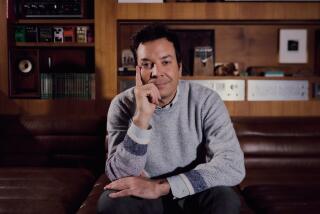TV INTERVIEWERS: GOOD, BAD AND PHYLLIS GEORGE
- Share via
Phyllis George beamed at the camera on “The CBS Morning News.” Then--a thoughtful expression on her face, a clipboard on her lap--she began to interview industrialist Armand Hammer about the health of Soviet President Konstantin Chernenko.
Never mind that she butchered Chernenko’s name. Never mind that it appeared that her questions had been written for her. Never mind that she’s more comfortable talking about the Dallas Cowboys than about a nation--such barbarism!--that doesn’t even play football.
Never mind that. This was Phyllis in Wonderland. Sure, she was pitifully inept and unprepared to co-anchor anything billing itself as a news program. But she was merely doing what many TV interviewers had been doing for ages.
Filling space.
Interviewing is skilled--and hazardous--labor. My first interview as a green reporter on the entertainment beat was with film critic Pauline Kael. I asked her a question. She said the question was stupid. I was devastated.
Luckily for me I wasn’t on TV where millions of viewers could see me make a fool of myself.
TV interviews range from the marshmallows served by sportscasters (“How do you feel about winning?”) to the verbal muggings on Cable News Network’s “Crossfire.”
Phyllis George is at the bottom of my list of TV interviewers; Ted Koppel of ABC’s “Nightline” at the top.
Koppel is state of the art, a regular rocket, so good at the toughest interviewing job on TV that “Nightline” would collapse without him. He controls the show, seldom allowing evasive guests to get off the hook. He is strong, splendidly prepared, agile-minded, incisive and, above all, fair. So who cares if his hair looks funny?
Here, in order, are my rankings of other TV interviewers (not including Johnny Carson, who is an institution, not an interviewer):
--David Hartman of ABC’s “Good Morning America.” An actor before getting this hosting job, Hartman proves that you don’t necessarily need a news background to prosper and have credibility on a news-type program.
Hartman asks pointed questions and is versatile. He’s as comfortable with foreign leaders as he was recently talking with Oscar de la Renta about his wardrobe designs for Barbie dolls (“Now, Oscar, how did you attack this? What was the challenge?”).
And look at his body language, his big frame thrust forward on the edge of his seat. He projects involvement. That’s a gift.
--Phil Donahue of the syndicated “Donahue.” Exchanging his Chicago base for New York, Donahue continues to be the master devil’s advocate, putting himself in conflict with his audience and guests without being abrasive. The topical and trendy mingle with the sensational and exploitative on Donahue’s show, which bristles with energy. There is no better hour of TV.
--Charlie Rose of CBS’ “Nightwatch.” Once a sort of cut-rate Donahue with his own syndicated series, Rose is a bright, informed interviewer as host of network TV’s only remaining overnight news program. He can listen and he can mix it up. But who is watching?
--Robert MacNeil and Jim Lehrer of “The MacNeil/Lehrer NewsHour” on PBS. MacNeil gets most of the press, but the even lower-key Lehrer is equally skilled in drawing information from a broad range of guests. Lehrer recently was masterful--dogged and quick thinking--in controlling a verbal skirmish between Abby Mann, who created the “The Atlanta Child Murders” on CBS, and Atlanta Mayor Andrew Young. MacNeil and Lehrer don’t make noise; they make sense.
Howard Cosell of ABC’s “SportsBeat.” I watched Cosell interview baseball commissioner Peter Ueberroth recently. Now Ueberroth is Mr. Slick. But Cosell’s precise questions produced precise responses. Cosell can be a load. But he is so superior to the typical sportscasting bobo that his excesses are almost tolerable.
--Mike Wallace of CBS’ “60 Minutes.” Wallace is a grinding griller, the kind of bully who wears down his subjects through intense pressure. But I’m never sure whether the on-screen credit should go to Wallace or to his field producer or to crafty editing.
--Barbara Walters of ABC’s “20/20.” Whether on “20/20” or interviewing celebrities on her prime-time specials, Walters does seem to draw things from her subjects that others can’t. Yet she is a showboat (don’t you love those melodramatic pauses?), who unfortunately injects herself into almost every interview. It is the nature of the medium, perhaps, that the TV interviewer is often a bigger celebrity than the interviewee.
--Bill Kurtis of “The CBS Morning News.” Kurtis is intelligent and news-smart. But he comes to the screen sunken with heavy baggage as the co-star of Phyllis George in a format that is oppressively soft and cheery.
--Sandi Freeman of CNN’s “Freeman Reports.” Give Freeman a human-interest interview and she lights up the screen. Give her a hard-news interview and she dives like the Titanic.
--Bryant Gumbel of NBC’s “Today.” I watched David Hartman and Gumbel interview First Lady Nancy Reagan on their respective shows one morning, and the comparison was devastating. Gumbel sometimes seems to be reading questions from a list, and there appears to be a plexiglass shield between him and those he interviews. He just doesn’t connect.
--Jane Pauley of NBC’s “Today.” Pauley often appears to be winging it and is victimized by bad research. Her typical interviews are processions of staccato questions, each unconnected to the other.
--David Letterman of NBC’s “The David Letterman Show.” Letterman faces interviews like a man facing a firing squad. But who cares? He’s a riot.
--Merv Griffin of the syndicated “Merv.” Griffin has a wide range, from Mr. Blackwell to Charo.
More to Read
The complete guide to home viewing
Get Screen Gab for everything about the TV shows and streaming movies everyone’s talking about.
You may occasionally receive promotional content from the Los Angeles Times.






